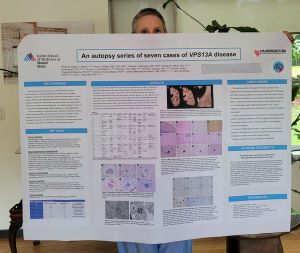 We are delighted to report that our second paper supported by funding from Neuroacanthocytosis Advocacy-USA has now been published on-line, and will be published in print very soon. This is a follow-up to our initial paper which found alterations in levels of certain fats (lipids) in the brains of people with VPS13A disease. Both papers are published in the prestigious journal Movement Disorders. PMID: 37670483 DOI: 10.1002/mds.29589
We are delighted to report that our second paper supported by funding from Neuroacanthocytosis Advocacy-USA has now been published on-line, and will be published in print very soon. This is a follow-up to our initial paper which found alterations in levels of certain fats (lipids) in the brains of people with VPS13A disease. Both papers are published in the prestigious journal Movement Disorders. PMID: 37670483 DOI: 10.1002/mds.29589
For the second paper we examined the brains of seven people with VPS13A disease who so generously donated their brains for research. Thanks to national and international collaborations, we were able to collect this number, which is the largest reported to date of this ultra-rare disease. The work was performed in the lab of Dr. John Crary, in the Pathology Department at Mount Sinai School of Medicine, much of it by NA-USA board member Ricky Ditzel, under the guidance of Drs. John Crary and Ruth Walker.
Prior to our report, the main observations in people with VPS13A has been that there is loss of brain cells in specific regions, and a lot of scar tissue, known as “fibrosis”; there have been no signs of clumps of proteins, such as are typically found in other neurodegenerative disorders, such as Parkinson’s, Alzheimer’s, and Huntington’s diseases. Intriguingly, in addition to the scar tissue which has been seen previously, we found some other features which we hypothesize may be related to dysfunction of fat metabolism within cells. These appeared in brain cells as clumps or grains of material that stained blue with the dyes we used. We also found some other unusual features such as deposition of calcium, and some other markers of damaged cells. Our work will continue to investigate these features further, and we will also perform parallel studies in XK disease (McLeod syndrome).
This project would not be possible without the generous gifts of people affected by NA syndromes, who have donated their brains and other body tissues to us to further our understanding of these awful diseases. Our gratitude also extends, of course, to their families, who work with us ahead of time to deal with the necessary paperwork and other logistics, and who make the critical phone call to us when the time comes, so that we can move quickly to get the most information from this valuable donation.